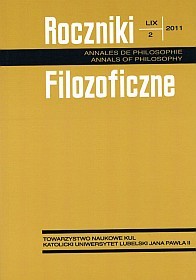On Some Problems of Naturalizing the Philosophy of Science Exemplified on the Controversy about Realism
Abstract
The main purpose of the paper is analysis of some problems referred to methodological understanding of the process to naturalize philosophy of science. This process can be considered as justification of philosophical thesis by scientific facts, and also as application of the methods of justification, which are effective in natural sciences, to philosophy of science. These procedures are often called philosophical interpretation of scientific facts, and their methodological validity is taken under consideration. This problem is analysed on the two examples, which are related to realism-antirealism controversy. One of them is the final argument for scientific realism. The second is the Arthur Fine’s Natural Ontological Attitudes.
References
Fine A. [1984]: The Natural Ontological Attitude, [w:] J. Leplin (red.), Scientific Realism, Berkeley–Los Angeles–London: University of California Press, s. 83-107.
Giere R. [2008], Naturalism, [w:] S. Psillos, M. Curd (red.), The Routledge Companion to Philosophy of Science, New York: Routledge, s.213-223.
Hajduk Z. [2004], Filozofia przyrody, filozofia przyrodoznawstwa, kosmologia, Lublin: TN KUL.
Kłósak K. [1980], Z teorii i metodologii filozofii przyrody, Poznań: Księgarnia św. Wojciecha.
Laudan L. [1984a], Explaining the Success of Science: Beyond Epistemic Realism and Relativism, [w:] J.T. Cushing, C.F. Delaney, G.M. Gutting (red.), Science and Reality: Recent Work in the Philosophy of Science, Notre Dame: University of Notre Dame Press, s. 83-105.
Laudan L. [1984b], A Confutation of Convergent Realism, [w:] J. Leplin (red.), Scientific Realism, Berkeley–Los Angeles–London: University of California Press, s.218-249.
Lipton P. [2004], Inference to the Best Explanation, London–New York: Routledge.
Mazierski S. [1972], Elementy kosmologii filozoficznej i przyrodniczej, Poznań–Warszawa–Lublin: Księgarnia św. Wojciecha.
Ogilvie J. [1990], The Nature of the Chemical Bond- 1990. There Are No Such Things as Orbital, „Journal of Chemical Education” 67, s. 280-289.
Pauling L. [1992], The Nature of the Chemical Bond – 1992, „Journal of Chemical Education” 69, s. 519-521.
Popper K. [1992], Wiedza obiektywna, Warszawa: WN PWN.
Putnam H. [1984], What is Realism? [w:] J. Leplin (red.), Scientific Realism, Berkeley–Los Angeles–London: University of California Press, s. 140-154.
Quine W.V.O. [1986], Epistemologia znaturalizowana, [w:] B. Stanosz (red.), Granice wiedzy i inne eseje filozoficzne, Warszawa: PIW, s. 106-125.
Quine W.V.O. [1986], Miejsce pragmatystów w empiryzmie, [w:] B. Stanosz (red.) Granice wiedzy i inne eseje filozoficzne, Warszawa: PIW, s. 145-162.
Scerri E. [2001], The Recently Claimed Observation of Atomic Orbitals and Some Related Philosophical Issues, „Philosophy of Science” 68 (Proceedings), s. 76-88.
Turek J. [2009], Filozoficzne interpretacje faktów naukowych, Lublin: Wydawnictwo KUL.
Urbański M. [2009], Rozumowania abdukcyjne, Poznań: Wydawnictwo Naukowe UAM.
Zeidler P. [2007], Status ontologiczny orbitali atomowych i molekularnych w kontekście autonomii chemii, „Przegląd Filozoficzny” 16, nr 3, s.191-201.
Zeidler P. [2010], Czy można zaobserwować orbitale? O problemie obserwowalności i realności przedmiotów teoretycznych, „Filozofia Nauki” nr 4, [w druku].
Copyright (c) 2011 Roczniki Filozoficzne

This work is licensed under a Creative Commons Attribution-NonCommercial-NoDerivatives 4.0 International License.





